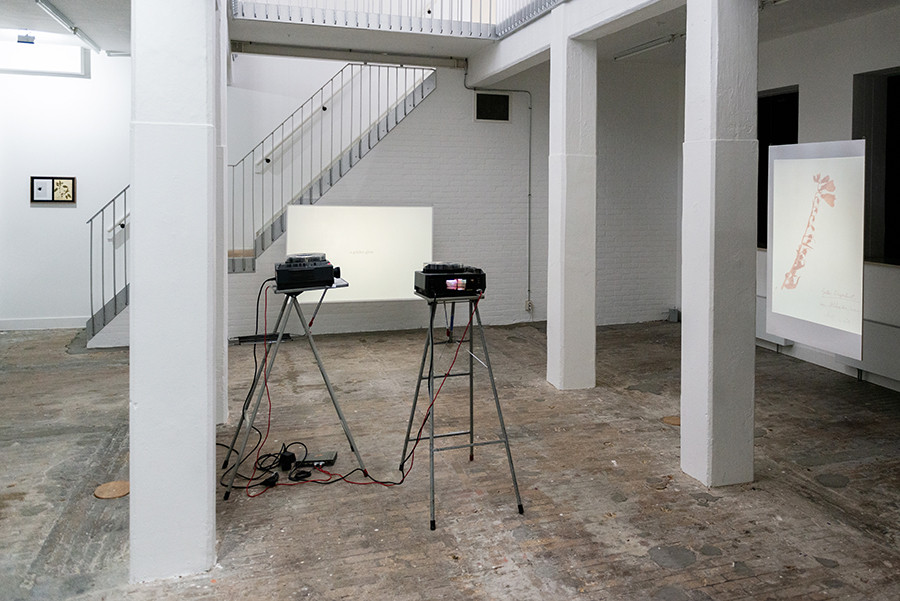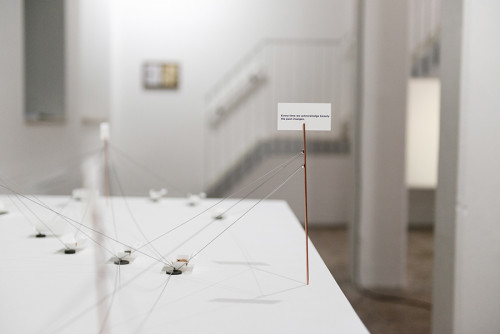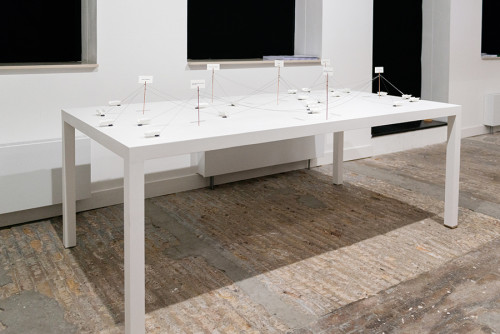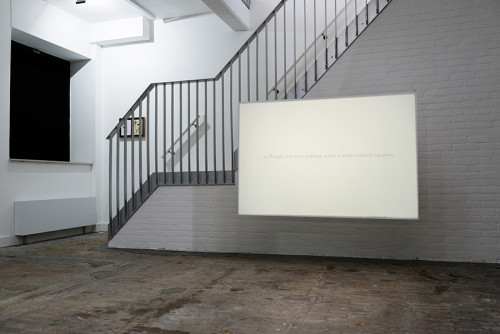
Exhibition view, Eden Hotel, 2019. Photo: LNDW Studio.
Eden Hotel
MILENA BONILLA
November 16, 2019 – January 26, 2020
The hour before sunset has a magic all its own.
Letter to Hans Diefenbach, Wronke, 29 June 1917
The exhibition Eden Hotel by Milena Bonilla revolves around the legacy of Polish Marxist theorist and revolutionary socialist Rosa Luxemburg (1871-1919). In response to key ideas articulated in her extensive body of work, the exhibition draws on Luxemburg’s passion for botany and her keen observations of natural phenomena, such as changes in the colour of sunlight as a marker of place and time. In Eden Hotel, Bonilla projects a worldview in which the natural world and revolutionary politics are not only deeply intertwined, but utterly inseparable.
Bonilla’s research on Luxemburg led her to a photographic archive of her extensive amateur herbarium, which is kept at the International Institute of Social History in Amsterdam (IISH) since its donation to the collection by Austrian socialist politician Joseph Buttinger in 1976. After being stored in the archive for over forty years, these photos now appear heavily bleached due to a deterioration phenomenon of certain C-prints in the absence of light, a process that is technically known as ‘dark fading’. In parallel, a plant equally loses its colour when it is cut and pressed in a herbarium. The colour of the facsimile prints of Luxemburg’s herbarium faded over time, while becoming part of an archival collection to preserve them for history, during a period in which the Cold War appeared as the main menacing force to the planet’s wellbeing.
In the newly commissioned work Dark Fading Chlorophyll (Luxemburg) (2019), the fading colour images of the plants accompany a series of sentences that Bonilla picked from letters that Luxemburg wrote to friends whilst being incarcerated in Berlin, Wronke and Breslau between 1915 and 1918. Each sentence emphasizes the author’s perception of colour, sunlight, and other natural phenomena. The plants that Luxemburg collected in her herbarium during these years of imprisonment act as agents in the exhibition: they reinforce the importance of cultivating relationships with what is not human, as a political and potentially healing act. The medicinal capacities of several of the common plants that Luxemburg collected from the prison grounds or received from friends in field bouquets are foregrounded in Spring starts as a murmur (Utopia) (2019). The plants resurfacing as seeds in the installation have been used traditionally to treat mental and emotional distresses, while their powers are now often obscured by allopathic medicine and its inner epistemological violence towards traditional practices.
The final new work in the exhibition, The Accumulation of Capital (riddled) (2019), responds to the specific architecture of A Tale of A Tub, and resonates in particular with the upper floor and its resemblance to prison architecture, through its bars and small windows. The Accumulation of Capital (riddled) (2019) departs from Luxemburg’s writings in The Accumulation of Capital, as an echo to her assassination in connection with the book’s content. A string of words was drawn out from the book by the force of a bullet, creating a group of riddles in the space from which different new meanings and associations with the original book may originate.
The Eden Hotel in Berlin was the last place where Rosa Luxemburg was interrogated before she was shot to death by the German Freikorps a hundred years ago. Bonilla invokes this infamous name in order to transform it, by using the exhibition space as a resonant field for words that have been left un-spelled and a political imagination that is infused with chlorophyll and light.
For an ecology of the mind.
Support
Eden Hotel is supported by the Municipality of Rotterdam, the Mondriaan Fonds and the International Institute of Social History (IISH), Amsterdam.

Milena Bonilla, Spring starts as a murmur (Utopia), 2019. Photo: LNDW Studio.

Milena Bonilla, Spring starts as a murmur (Utopia), 2019. Photo: LNDW Studio.

Milena Bonilla, Dark Fading Chlorophyll (Luxemburg), 2019. Photo: LNDW Studio.

Milena Bonilla, The Accumulation of Captial (riddled), 2019. Photo: LNDW Studio.

Milena Bonilla, The Accumulation of Capital (riddled), 2019. Photo: LNDW Studio.

Milena Bonilla, Spring starts as a murmur (Utopia), 2019. Photo: LNDW Studio.

Milena Bonilla, Dark Fading Chlorophyll (Luxemburg), 2019. Photo: LNDW Studio.

Milena Bonilla, The Accumulation of Capital (riddled), 2019. Photo: LNDW Studio.